'You're not a hardman… it's not like you're down a dark alley, shirts off, going at it knuckle to knuckle'

Some players hang up their boots and, like silverback gorillas, traipse off into the jungle never to be seen again. One such player is Julian White, the tighthead who, by most people’s estimation, led a life less ordinary in professional rugby. After retiring in 2012 at the ripe old age of 38, he had accrued 51 caps for England, made four Lions Test starts and picked up three English Premiership titles. His battle scars tell of a career spent at the coalface, both physically and metaphorically.
With the mien of a burly doorman and a vacant glaze in the battle that could curdle milk at a hundred paces, White forged a reputation as an enforcer on the field, but when RugbyPass caught up with him, he was wrestling with some altogether fluffier opponents – spring lambs ready to go to market. The baaing gave a mellifluous backdrop to a rip-roaring tale which veered from the pint and pies nostalgia of amateurism to the sterile, ruthless realities of professionalism with alacrity.
White’s rugby journey started in Plymouth where his late father packed down behind him at Salcombe Seconds XV before his prodigious strength and predilection for the physical side of the game saw him graduating to run-outs with Okehampton and Plymouth Albion. It was the mid-nineties and White had no idea he would make a living out of a game he loved.
He preferred the home comforts of Devon, even when the offers started to drift in from newly cash-rich clubs as his reputation soared. An early companion to White’s burgeoning career was the propensity to get himself on the wrong side of the law and his aggressive approach often saw him trudging towards the touchline prematurely.
One such occasion led to him making a life-changing decision. “My disciplinary record was pretty chequered when I was coming through as an amateur,” White admitted. “I was banned for a year at one point for something or other, so I thought I’d get away from it and go travelling.”
After a six-month stay in New Zealand, another rush of blood to the head on his return to the UK saw him considering a one-way ticket out of dodge. “After being sent-off for Plymouth Albion I was banned again so I thought, ‘Bugger this, I may as well go back to New Zealand and play there, they won’t know who I am’.”
Without sounding too much like The Fugitive, White packed up his kit-bag and headed 12,000 miles to the North Island and the small town of Dannevirke where he got down to playing some ‘footie’. It was relatively pre-internet in those days, so his lively reputation didn’t precede him and even though he principally went over for a few months, he ended up staying for the best part of two years.
Still only 22, his ability to lock down a scrum and aggressively go after the loosehead was duly noted and he was selected for Hawkes Bay in the Mitre Cup. “When I went out there, I got absolutely battered. I learnt that if you fell the wrong side of the ruck, you’d regret it. Honestly, I’d never been booted so hard in my life. By the same token, you soon realised if someone fell your side you’d give him some pain as well, do you know what I mean?”
White’s raw ability saw him play briefly for the Canterbury Crusaders but a tragic accident on his way back from a physio session sped up his return to the UK. It was an event which haunts White to this day. “At the time I was doing a lot shearing and crutching so when I hit this scrum my back seized up. After my final treatment, I was on my way back to Dannevirke on a dark, drizzly old night and had a head-on collision with another car.
“I managed to crawl out of the wreckage but sadly the lady in the other car was killed which was not good at all. I’d been all set for another season with Hawkes Bay but with a broken leg, I couldn’t play. I then had a phone call from John Phillips to go to Bridgend. He was trying to instil professionalism, you know, asking the boys not to out on the beers the night before, which didn’t make him very popular!”
The wild-west nature of those embryonic years in professional rugby was not lost on White but he was enjoying the ride in his responsibility-free mid-twenties. “My two years at Bridgend were brilliant but mental. I was quite green and naive, playing with guys like Justin Burnell and Ian Greenslade about the time Gareth Thomas was leaving for Cardiff but we were nearly relegated and the club went bankrupt. It was a flipping disaster.”
White impressed enough, however, to be invited to play for Wales A at a time when Ben Evans was the first-choice tighthead and Adam Jones still had L-plates on. With a niggling injury, he declined and instead turned his thoughts to making it with England. A move back over the Bridge was deemed the best course of action.
“My father, in his wisdom, sent me the way of Mike Burton, who is the world’s worst agent in my view. Before that, I’d been speaking to Graham Dawe who was trying to get me down to Plymouth Albion again but the feelers were put out for Harlequins and Dean Richards at Leicester.
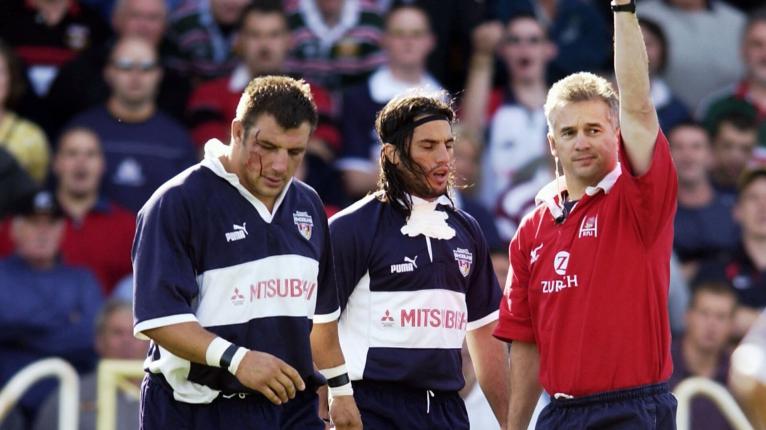
“But I didn’t speak to any of those and ended up being signed by Saracens. At the time they had this fully star-studded team with the likes of Richard Hill, Kyran Bracken, Francois Pienaar, Thierry Lacroix and Thomas Castaignede and we’d swan about in this massive branded bus. It was very different from Bridgend!”
White made friends in London but hankered after a return to the south-west. A deal to sign for Bristol was arranged but his head had been turned by Bath and the ensuing palaver made him consider his livelihood. It marked a low point in his career. “I’d always wanted to go back to the West Country, but it was really messy. Bristol approached me illegally and tried to hand me some cash, so I signed a contract but thought I had an opt-out clause. It all went horribly wrong and we ended up in court.
“I tried to get out of my Bristol contract and had Andy Robinson, the Bath coach, phoning me saying, ‘We need you at Bath, we need a prop, Whitey’. So I was having sneaky training sessions with them. Initially, I was told it would be an open and shut case, that I was going to be free to play for Bath, but when I switched lawyers I got battered by the big-shot Bristol legal team.”
The ruling left White distraught, thousands of pounds out of pocket and pondering his future. “For a while, I thought about jacking it in. I had no one to assist me and I thought, ‘Bugger this’. It really stressed me out. I’d just played for England and Clive Woodward said, ‘You play for whoever you like, Whitey, just keep yourself fit’. I thought I love my rugby but I’d prefer to just play with bloody Okehampton. I thought, ‘I don’t need this s***’.”
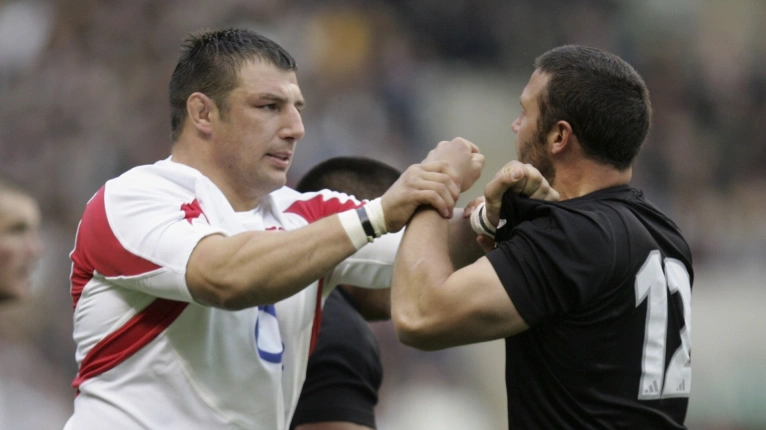
While he assessed his options, he had a message from Bristol’s head coach Dean Ryan saying he’d better come to Bristol otherwise he could be taken to court again, so White begrudgingly pitched up at the Memorial Ground to a partisan welcoming party. “When I turned up, the crowd were screaming ‘Bath reject, Bath reject’ in this thick West Country brogue,” he laughed.
“In fairness, Bristol had a really good side in that first year. We got into the play-offs, but all the talk after that was, ‘Is Ryan going to stay?’ Soon enough, we found out he was off to Gloucester and in my second season, the money started to dry up. We had this old boy from New Zealand, Peter Thorburn, who was bloody useless and we got relegated. We were owned by a guy called Malcolm Pearce but financially we just couldn’t seem to find any stability and it filtered onto pitch eventually.”
Despite another turbulent period, White rubbed shoulders with a few more of rugby’s great and good, including a man who last weekend was just three votes from running World Rugby – Agustin Pichot. “There was always an aura about old Pichot. He had this presence; some people call it charisma. He was mates with Maradona and was always threatening to get Diego down to Bristol. He was different to the rest of us but I rated him as a scrum-half. He was a fantastic player, very tenacious and he believed in himself, which is what you need.”
While at Bristol, White’s disciplinary run-ins were ongoing as he was sent off three times in two years, culminating in a ten-week ban for headbutting Graham Rowntree after the judge halved the ban for provocation, so there was a sense of irony that his next port of call would be Welford Road just months before the 2003 Rugby World Cup.
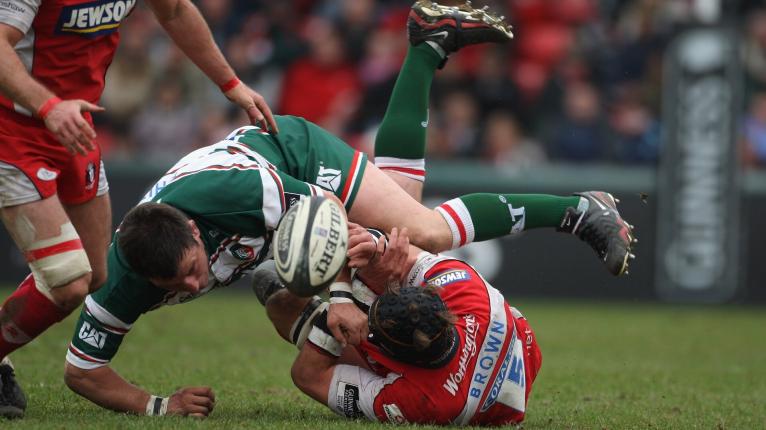
There were to be no more moves. Leicester became home for the next nine years as he went on to make 158 appearances for the Tigers, and the prop still lives in the countryside outside the city. “As soon as Bristol were relegated, Leicester were after me. Darren Garforth had been their long-time tighthead but when he retired, they brought in Franck Tournaire which didn’t really work out.
“It just seemed to click there. We had such a winning ethos. Everyone was so driven and focused. Sometimes we’d train so hard that maybe the coaches thought we deserved to win just for effort, but we were often hanging in games. We pushed it too hard on occasions.”
Despite a trophy-laden spell with the club, White said lifting silverware wasn’t the memory that lingers. “Sometimes winning stuff is almost anti-climatic. For me, motivation came from the struggle of getting there. Personally, the games I remembered best were out in France and the more hostile and physical the more I liked it. After games, we’d normally have to do some corporate stuff but I’d try and swerve that. I was happiest going into the supporters’ bar and having a few beers there with my mates.”
Away from all the domestic trials and tribulations, White forged a distinguished international career, playing in seven Six Nations campaigns, featuring in England’s 2003 World Cup-winning squad and having a near decade-long rivalry with Phil Vickery. “Vicks was my biggest rival for the No3 shirt, undoubtedly. He was a good player, but at the time when you’re trying to earn the starting shirt, you want to find any little edge you can get. Vicks could do things I couldn’t and I could do things he couldn’t so I guess we complemented each other for England.”
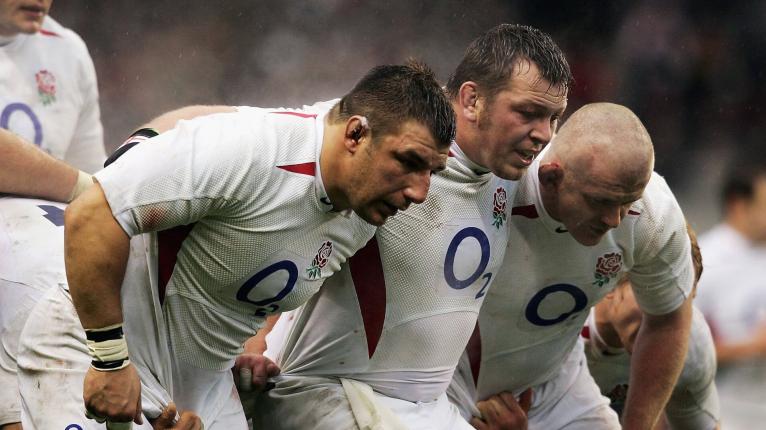
Pulling up his half-century of caps against Argentina in 2009 at the age of 36, White appreciated the gilded skillsets of the likes of Josh Lewsey and Dan Luger, but one player stood out. “Jonny (Wilkinson) was phenomenal. His skillset was amazing. You just accepted Jonny for who he was, an obsessive, but what a player. He won us a lot of games.
“It’s funny, in a squad you remember who you did and didn’t get along with. I mean, we all have our moments. You can be the greatest player in the world but if you’re an arsehole and don’t knit with the team, it doesn’t work. Take the World Cup in 2003. A lot of players have made a lot of money out of it but I barely go to any events. I went to one but felt a bit of a con because I didn’t play in the final but you see players recounting stories they have told a zillion times. It’s not for me.”
The highlight of the prop’s career should have been with the 2005 Lions, but the truth was somewhat different after a chastening 3-0 series loss exacerbated a tour beset with problems. White doesn’t mince his words. “It was a bloody shambles. You talk about the pride of playing for the Lions but with that 2005 tour you think, ‘Please don’t mention it’. It was shocking.
“I dreamt about playing for them but it left a bitter taste in the mouth. We had a few massive egos in the coaching team who had been very successful but there was a clash of personalities. The amount of support staff was crazy. We even had Alastair Campbell as our press officer. I mean, why, why? It was bonkers.”
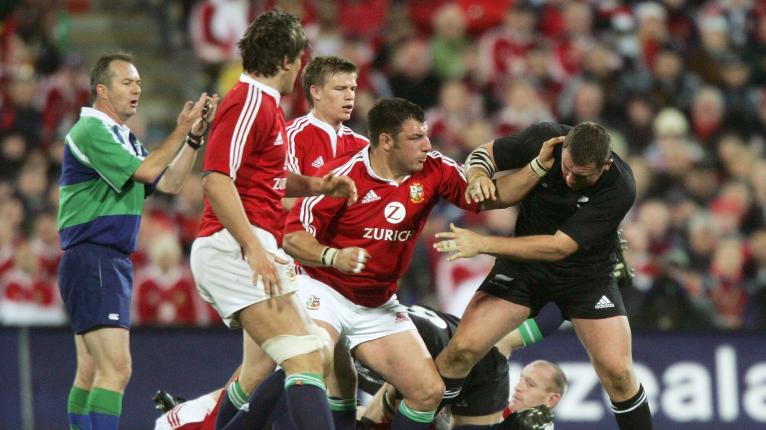
From White’s earlier experience of living down there, the only way the Lions were going to earn respect was to go off, train in the middle of nowhere, turn up on the day and win, but the opposite happened. “We were told we were going over to win over hearts and minds of the New Zealand public and they were going to be cheering for us so we were doing lots of hospital visits, going to schools and getting hakas from hundreds of kids.
“It was all bulls***. We didn’t even go for beers, something the Lions had always done historically. It was all very structured and not particularly enjoyable for anyone. Saying that, the New Zealand side were incredible. One of the best Kiwi sides ever. Richie McCaw, Dan Carter and Tana Umaga were in their pomp and we were taken apart!”
Even to most casual rugby fans, White’s name stirs up memories of a man who didn’t mind some argy-bargy and throwing his 6ft 1in, 19st-frame around when riled. Exhibit 1: Malcolm O’Kelly and Exhibit 2: Andrew Sheridan spring to mind for the YouTube generation.
“Did he relish his reputation as someone who could mix it on the field? “It was all bulls***, wasn’t it? You’re not a hardman. You’re stood on a pitch with a bloke frantically trying to separate you by blowing his whistle. It’s not like you’re down a dark alley, shirts off, going at it knuckle to knuckle. A lot of it is luck, whether you catch him or he catches you. If you’re slowest to the draw, you fall to the floor and look an absolute knob. My scrap with Sheri was hyped up. If he’d whacked me a bit harder, he’d have beheaded me.”
As the conversation nears an end, thoughts turn back to White’s day job where the lockdown has given time to think about the farming industry. “Being really boring, which I’m pretty good at, in farming, we’re dictated to by supermarkets. They want certain standards we adhere to but at the slightest chance, they’ll import the meat in from Eastern Europe. There’s no loyalty.
“We’re not like the French, who stand together. There’s always someone who breaks ranks so we lose that power. It’s as bad as it has been for years. We’ve been diversifying and do some glamping, which has been popular, and we have some woodland behind the farm to put in some treehouses so we’re waiting for planning permission.”
As for his final thoughts about an incident-packed career, White – who turns 47 on May 14 – sagely strokes his chin. “I class myself as an amateur player who played professional rugby. Even now, I sit on the tractor and see the boys belting out the national anthem during the Six Nations and think, ‘Holy s***, I was involved in that at one time’.
“I don’t even know where my rugby kit has gone from those days. I don’t even have my cap. We have some cattle trophies, but that’s about it. Saying that, I count myself as fortunate because it was the right time to play. We had a lot of fun. When I retired it was a case of, thank you and goodnight. Life moves on. I’m happy.”
As straight-talking off the field as on it, we may never see White’s like again. Perhaps rugby is the poorer for it?






























































